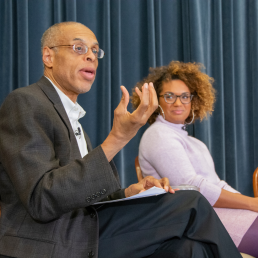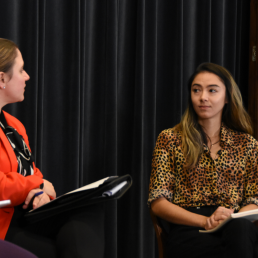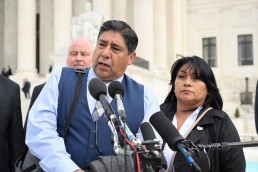IIPSJ Comments On the National Strategy for Expanding American Innovation
Diversity in IP enterprise and innovation is critical and long overdue. The need has been highlighted in the USPTO report in response to the SUCCESS Act. IIPSJ Comments on NCEAI (1)
Black Expression, Black Protests, and Black Lives
Black Expression, Black Protests, and Black Lives
A Look at What Black People Have to Lose At the Hands of the EARN IT Act
We are living history: a pandemic that has disproportionately killed Black people, the murders of Ahmaud Arbery, Breonna Taylor, and George Floyd, and the racial reckoning that soon followed. All this in the final months of a presidential election. There has never been a more important time to fight for free speech online than now.
This Administration’s position on this moment in history was made clear during the White House’s July 4th celebrations. Standing in a packed amphitheater in front of Mount Rushmore, President Trump delivered a divisive speech that described his presidential campaign as a battle against a “new far-left fascism” seeking to wipe out the nation’s values and history. He went on to describe protestors as “angry mobs...trying to tear down statues of our founders, deface our most sacred memorials and unleash a wave of violent crime in our cities.”
The President made no mention of the disproportionate impact of Covid-19 diagnoses and deaths among Black Americans or the validated fear that policies to open up communities will not be borne equally. Nor did he mention the images and videos of horrific police violence against Black Americans — especially the deeply disturbing killing of George Floyd — that went viral on platforms like Facebook, YouTube, and Twitter, sparking protests in all fifty states.
Amidst that spark, social media platforms became a tool to organize our activism, amplify our voices, and share our version of current events - a phenomenon that would have been actively impeded without Section 230. Written in 1996 by former Congressman Chris Cox (R-MN) and Congressman Ron Wyden (D-OR), Section 230 fostered free speech and innovation online by establishing that users, not the website that hosts their content, are the ones responsible for what they post online. It also gave companies the ability to limit exposure to offensive content like tweets that glorify violence without fear of being sued for bias or having their site shut down.
This past week, the Eliminating Abusive and Rampant Neglect of Interactive Technologies Act of 2020 (EARN IT Act), a law that forces online platforms to change how they moderate content online by censoring more of their users’ communications, was voted out of committee. Under the EARN IT Act, platforms would lose Section 230 protections and likely take drastic measures to mitigate their exposure. Measures that would not only limit free speech across the Internet but will disproportionately silence the voices of Black people.
It goes without saying that even with the protections of Section 230, social media companies continue to struggle with the task of content moderation. But we have to consider the strong possibility that without Section 230, sites would either limit what users can post, to avoid being sued, or stop moderating entirely. In the first scenario, content like the videos that captured the officer kneeling on George Floyd's neck and Eric Garner’s haunting final words of “I can’t breathe,” would have been blocked from social media platforms. In a world without 230, platforms might not allow posts that are critical of the Administration’s response to the pandemic because they could be interpreted as defamatory. In the second scenario, sites would choose not to moderate at all, and thus avoid responsibility for anything their users post. These sites would be breeding grounds for false, dangerous and hateful content.
In the days leading up to one of the most important elections of our lives, we cannot support any acts by Congress that will stifle our ability to power our movements and express ourselves. The EARN IT Act endangers the momentum of our activism and our ability to lift up our own narratives.
Blog Post On 17th Annual IIPSJ CLE Conference
17th Annual IP & Social Justice CLE Seminar
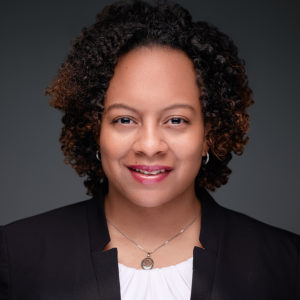
by Tashia Bunch, CLE Co-Chair
Thank you to all that participated in the 17th annual IP and Social Justice CLE program. Our program is the longest running IP and social justice CLE program in the country. We work hard to start conversations surrounding diversity in IP and to help ensure these conversations continue to take place. And our conversations aren’t just theoretical, we focus on real world solutions for increasing awareness of social justice issues and diversity in the field of IP. We focus on diversity in several ways; diversity of our CLE panelists, diversity of attendees, and discussions of how IP ownership impacts diverse communities.
Diversity of our CLE panelists: Every year we feature Howard Law alumni on our panels and we attempt to include someone from a minority group on every panel. This year all but two sessions included a minority speaker.
Diversity of attendees: Each year we attract a highly diverse audience to attend our program. This year, the program was held at Howard University School of Law attracting students and alum of the prestigious HBCU (Historically Black Colleges and Universities). Additionally, we offer a discounted rate for alumni of Howard Law and next year we expect to expand that discount to attendees that are alumni of any HBCU in the nation.
Discussions of impact of IP on diverse communities: Every year, we ask all of our speakers to be sure that they discuss the social justice implications of the topic they are covering at our program. We also host a social justice luncheon which annually features one or two discussions of IP rights and social justice.
This year, we had sessions featuring discussions on ways to increase diversity in the IP bar, including federal judges offering career and practice tips to Howard Law students in attendance to increase the pipeline into the profession to in house counsel discussing ways to increase diversity and inclusion at their own companies and within the law firms they work with.
This year’s social justice luncheon featured two topics. The first was a discussion of the recently passed California Pay to Play Act and the fairness of allowing student athletes to be compensated for use of their name, image, or likeness and what this law and others like it that are being circulated in state legislatures around the country could mean for student athletes. The second panel “Remembering Invention of a Slave: Patents and the Continuing Struggle for Civil Rights” discussed inventorship and the struggle to acquire patents in the African American community.
If you weren’t able to attend this year, you missed a day of lively and engaging discussions. We hope that you will consider joining us next year. Thanks to one of our sponsors, Microsoft, we were able to record several of the CLE sessions this year. We plan to share some of these videos with you throughout the year to encourage you all to engage in these conversations.
Please save the date for next year’s conference – Friday, March 5, 2021
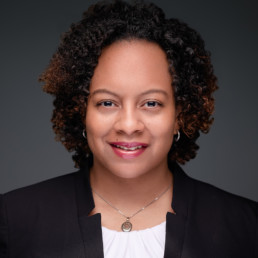
Tashia is a 2006 graduate of Howard University School of Law, which is how she first learned about IIPSJ. She currently works as a Legal Policy Attorney in the Office of the Deputy Commissioner for Trademark Examination Policy at the United States Patent and Trademark Office (USPTO). Previous positions at the USPTO included serving as the Acting Trademarks Chief of Staff and as a trademark examining attorney.
Blog Post On IIPSJ Participates in Event at Copyright Office
IIPSJ Joins Copyright Office to Discuss Social Justice and Empowering Creators of Color to Protect Their Creative Works
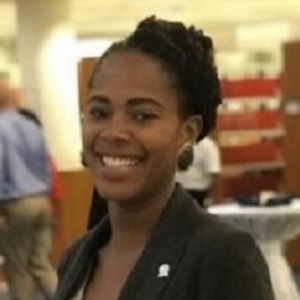
by Morgan Sills, Howard University School of Law ’21
On January 15 th the U.S. Copyright Office hosted a panel entitled “Copyright and Social Justice,” as part of its Copyright Matters series. The event explored the intersection of social justice and copyright protection, with a special focus on historically disadvantaged communities that are often unable to access protection for their work.
Opening remarks were given by Hakeem Jeffries, who is a U.S. Representative from New York and a member of the House Subcommittee on Courts, Intellectual Property, and the Internet. Representative Jeffries began the event by stressing the Constitution as the foundation of power for copyright protection and recognizing the emphasis placed on intellectual property rights by the Founding Fathers.
As the first panelist to speak, IIPSJ Founder, Professor Lateef Mtima, set the framework of the discussion by highlighting the social injustice surrounding communities that are unable to use the copyright system to protect their creations. As a result, the copyright system and structure of intellectual property rights as a whole both suffer from the exclusion of their talents and cultural contributions. IIPSJ’s Executive Director, Kim Tignor, reflected on the experiences of hip-hop groups like De La Soul and their noticeable absence from digital streaming services to illustrate the barriers faced by many artists today. She explained that there is a need to “decode” the copyright law so that artists can fairly profit from their efforts; and pointed out how the legal community often fails to educate creators on their ability to use digital space for the fair distribution of their work.
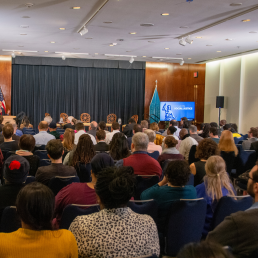
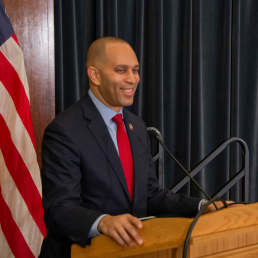
Hollis Wong Wear, a Grammy-nominated singer, songwriter, and producer, presented her perspective as an artist and advocate for other creatives. She voiced the idea that copyright lawyers can learn a great deal from artists and how legal regulations shape their reality, especially with expanded access through social media. She also used the example of Prince and his highly publicized fight against Warner Bros. to gain ownership of his master sound recordings, noting the social and economic impacts of such victories.
Law Professor and Co-Director of the IP Program at George Washington Law, Professor Robert Brauneis reported his findings after conducting research on thirty-five years of registration history. Consistent with the
reports of the previous panelists, Professor Brauneis reported that certain minority groups owned a significantly low number of actual copyright registrations compared to the amount of copyright eligible work they produced. He pointed to the CASE Act as a remedy for this situation, in
addition to the power of copyright attorneys and policy makers to serve creators and educate them on the best tools to benefit from their labor.
